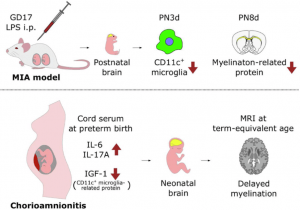Microglia are specialized immune cells in the brain responsible for maintaining neural health. One of their most important functions during early development is to support myelination—the formation of the myelin sheath that insulates nerve fibres and ensures rapid signal transmission in the nervous system. Among microglia, the CD11c-positive subtype appears to be especially important in this process. These cells produce IGF-1 (insulin-like growth factor 1), a protein that promotes myelin formation.
A new study has revealed a biological link between maternal inflammation during pregnancy and delayed neurodevelopment in infants (Figure 1). The research identifies a specific group of brain immune cells—CD11c-positive microglia—as critical players in the process, offering a new target for future interventions.
The research team examined mouse models exposed to maternal inflammation—simulating conditions like infections or autoimmune responses during pregnancy. They discovered a significant reduction in CD11c-positive microglia proliferation in the offspring.
To test if these findings translate to humans, the team then examined cord blood samples from preterm infants exposed to chorioamnionitis, a pregnancy complication involving infection and inflammation. These samples showed reduced IGF-1 levels, and MRI scans confirmed delayed myelination in the affected infants.
This research supports a new biological pathway by which maternal immune activation can affect the developing infant brain. If the activity of CD11c-positive microglia is impaired, it can compromise myelin formation, potentially leading to long-term cognitive and behavioral challenges in children.
The findings open the door to future preventive or therapeutic strategies aimed at protecting infant brain development in cases of maternal inflammation.
Journal article: Fuma, K., et al., 2025. Prenatal inflammation impairs early CD11c-positive microglia induction and delays myelination in neurodevelopmental disorders. Communications Biology.
Summary by Stefan Botha











